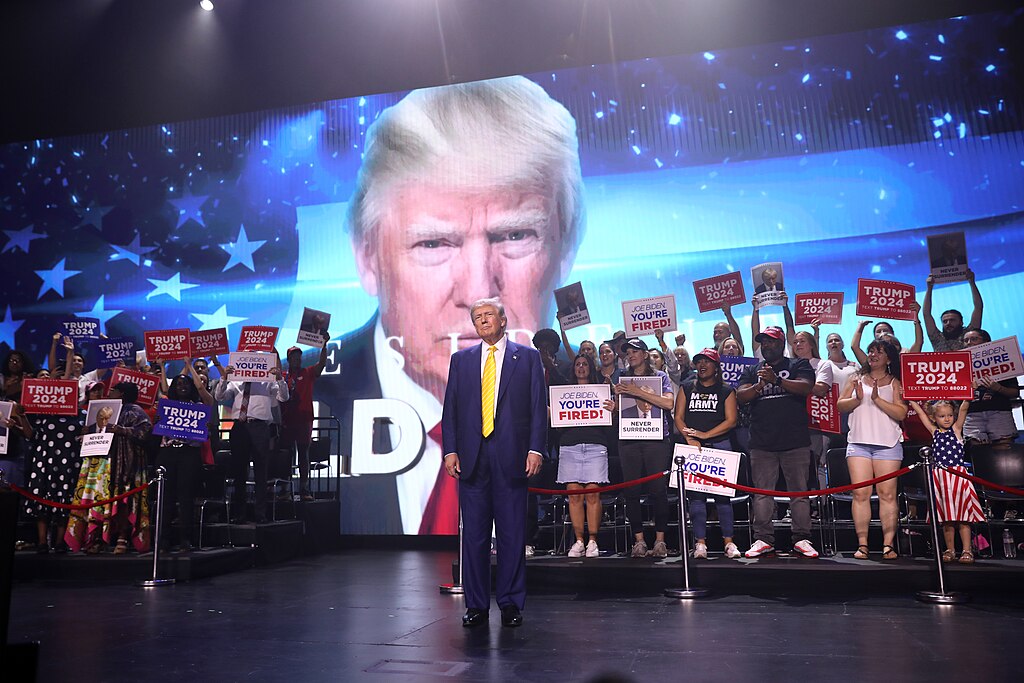A Profile of Trump Voters: Values and Policy Preferences

Former President of the United States Donald Trump speaking with attendees at a “Chase the Vote” rally at Dream City Church in Phoenix, Arizona, June 6th, 2024 (Credit: Gage Skidmore/Flickr)
Second of the Series “Attitudes, Concerns, and Policy Preferences of Trump Voters”
By Wayne A. Selcher, PhD* [Informe OPEU]
The Current State of Affairs
Donald Trump’s Make America Great Again (MAGA) movement established total domination of and unity within the Republican party by the time of the party’s mid-July 2024 National Convention, including with the selection of former sharp critic and now staunchly loyal populist J. D. Vance as his vice-presidential candidate. Trump has thoroughly reshaped the Party into his own image and incorporated former primary election rivals Nikki Haley and Ron DeSantis fully into his camp, as they gave speeches praising him at the Convention. The Party’s 2024 platform is definitely full-on Trump and goes well beyond the policies of his presidential term. The populist rhetorical turn of the Party was summarized in J.D. Vance’s declaration that “”We’re done, ladies and gentlemen, catering to Wall Street. We’ll commit to the working man.”
Trump’s narrow escape from a shocking attempted assassination at a rally on July 14 and his vigorous recovery to appear amid great acclaim and with an unusually long acceptance speech at the Convention further enhanced his image and popularity within the Party as a strong fighter, a victim of the corrupt establishment, and a maligned patriot. (Access his full Convention speech in video and in transcript.) His raised fist and defiant shouts of “Fight! Fight!” as he was carried off the stage by guards after he was wounded became a rallying cry for the Party, and a photograph of that moment became a party icon. Trump said in his speech, “And I’ll tell you I stand before you in this arena only by the grace of Almighty God.” Many religious supporters professed to see the hand of God in his survival, to continue his work against the decline of America and of religion.
[Sensitive content] Video shows moment of Trump assassination attempt at rally (Source: ABC News/YouTube)
In all, this boisterous unity around Trump’s person and the high degree of symbolism granted to him by followers presented a very strong contrast to serious Democratic divisions and stumbling at the same time, even arguing for months about the wisdom of the widely unpopular and faltering President Joe Biden’s continuing in the race.
Biden subsequently announced on July 21 that he was dropping out of the campaign for president, and endorsed Vice-President Kamala Harris, a decision that came disadvantageously late in the nomination process. Biden is almost unanimously disliked by Republicans, and Trump immediately portrayed his departure as “as an admission of failure and deceit.” Consumers of conservative media had learned about Biden’s advancing serious frailties for years, while the liberal media ignored, hid, or denied it.
The characteristics, attitudes, concerns, and policy preferences of Trump voters will be understood here to be those of Republicans and Republican-leaning Independents generally, in view of the degree of party unity. The enthusiastic Trump fans have a firm personalistic loyalty to him and take their cues from him and from allied media sources, such as Fox News, OneAmerica News, Newsmax, and The Gateway Pundit, said to be Trump’s favorites They thoroughly distrust and consistently react contrary to the largely progressive mainstream media, disregard his character and legal issues, and believe, ignore, or excuse his constant lying and personal grievances, carried out at a level very far above the usual for American politicians.
Those observers who wish to learn the official and specific policy proposals of Trump and the Republican Party for the 2024 campaign can consult Trump’s own Agenda 47 and the 2024 Republican Party platform. They pledge thorough and radical changes in government institutions, civil service personnel, policy, and governing style. Also relevant is the Heritage Foundation’s Project 2025, the result of collaboration among over 350 conservative organizations to turn the tables and reverse decades of progressive control of the bureaucratic machinery that administers American government, including regulatory agencies (the “deep state”). The overall strategy is to replace current government personnel at all levels with those loyal to the right and to centralize power in the presidency and “lay the groundwork for a White House more friendly to the right.” Trump has disavowed any connection with this project, but many of its recommendations align very well with his priorities and were made with him very much in mind and by a number of his close associates.
Fundamental Philosophical Differences as a Cause of the Current Polarization
Before we delve into details of more apparent partisan differences, it is useful to note, in the broadest sense, and in view of the troubled national mood of social tension and crisis atmosphere in the 2024 elections at nearly all levels, that two disparate basic political philosophies are at play in both parties during this polarization. These views are based on contrasting and deeply-rooted personal philosophies in the electorate and their related views of human nature. Winograd and Hais of the Brookings Institution, working with data from an unusually insightful and substantive 2024 Economist/YouGov poll, attribute the discord and sharp polarization to two clashing macro worldviews, now evenly divided in the electorate and striving for national dominance in campaign 2024. These conflicting worldviews underlie the more evident ideological and party preferences — optimism (emphasizing opportunities and American resilience and progress) versus pessimism (emphasizing dangers and threats to society and the national culture and existence). “Individuals who hold the darker view of the world see threats to their safety everywhere and place the highest priority on government action to protect them from these perceived dangers. Individuals who hold a brighter view see the world as a place full of wonder with inherently good people living in it and want us all to become better connected.”
In the poll, Republicans (64%) and conservatives (71%), probable Trump voters, tended strongly to adhere to the threat and protection side: “Our lives are threatened and our priority should be protecting ourselves.” Democrats (66%) and liberals (76%), probable Democratic voters, subscribed heavily to the option: “The world is full of good people and we should not allow ourselves to become isolated.” Independents were evenly split between the two worldviews, at about 40% each. The poll also noted that the negative worldview (anxieties and sense of threat) among Americans of all categories had increased its prevalence during 2024, compared to the previous year, as events, news coverage, and political advertising of a wide variety heightened the negatives and uncertainty regarding national and international instability and the economy. Predominant moods in the public matter very much in elections, and skillful politicians can ride those moods to victory.
The two campaigns in 2024 do, indeed, both play to both of those two contrasting attitudes and tones, to differing extents, aside from other underlying themes and specific issues and policies. The Economist/YouGov poll showed growing worries and concerns in all sectors of American society, but far more so among Republicans and conservatives, groups that are now out of government power in Washington, most distrust current political institutions, and see themselves as deliberately disadvantaged and disparaged by the mainstream media, intelligentsia, cultural elites, and higher education. There is also a growing tendency among voters in general to re-evaluate Trump’s presidency in a more positive light, contrary to the highly negative ratings in January 2021 after the January 6 attack on the US Capitol by Trump supporters. General public unease about the economy and illegal immigration under Joe Biden have helped Trump’s approval ratings, so he emphasizes those more recent concerns in his campaign. These trends have favored wider receptivity to Trump’s messaging, as his support grows in social sectors earlier less favorable to him, including African-Americans and Hispanics. (Further ongoing quality poll data and analysis on the 2024 campaigns are available at YouGov, as well as at the Gallup Poll’s 2024 Presidential Election Center and its Election 2024 site, among others.)
 (Archive) Rioters outside the US Capitol building holding US flags and “Make America Great Again” flags, 6 January 2021 (Credit: Tyler Merbler/Wikimedia Commons)
(Archive) Rioters outside the US Capitol building holding US flags and “Make America Great Again” flags, 6 January 2021 (Credit: Tyler Merbler/Wikimedia Commons)
Values and Policy Preferences
Personalities and current events aside, numerous polls and studies have delineated the many consistent and major differences in the attitudes, values, and policy preferences between Republicans and Democrats, often including Independents who tend to vote regularly for the same major party. The ongoing Vanderbilt Project on Unity and American Democracy’s most recent Vanderbilt Unity Index “shows the country continuing its trend toward more polarization, ending 2023 down nearly three points from the start of the year.”
Cultural or social issues are among the most contentious and bitter in the 2024 campaign, and highly emotional, because many of them are related to basic beliefs and voters’ divergent definitions of what makes a sound society and “what it means to be an American” or “What America stands for.” Polls indicate consistently that the level of confidence in American institutions in general, a major aspect of what America is, is at an all-time low in the history of polling. Approval ratings of federal government agencies and the Supreme Court are low. Government and governance are seen as top-level national problems by members of both parties. In political affiliation, Independents far outnumber both Republicans and Democrats since 2008, and the rate of Democratic identification is falling. Anti-corporate sentiment and suspicion of technology companies are now widespread in both parties, as Republicans become more populist. Public appraisal of the moral values of the nation is at a low. One Gallup analysis ventures that “We may be entering an era defined by fundamentally skeptical, cynical and negative views of social institutions and structures. We can call this the age of arbitrariness — the idea that social constructs are arbitrary and have no inherent legitimacy.” Donald Trump’s messaging is precisely and skillfully tailored to address the public’s discontents and anxieties about these cultural shifts, as well as about the economy.
Americans widely agree that “democracy is on the line” in the 2024 election, but differ greatly on what the threat to it is, with each side blaming the policies and actions of the other, as partisanship invades the supposedly neutral democratic functions of election integrity, the objectivity of misinformation fact-checking, and judicial impartiality. PBS noted in December 2023 that “A poll from The Associated Press-NORC Center for Public Affairs Research found that 62% of adults say democracy in the U.S. could be at risk depending on who wins next fall. Majorities of Democrats (72%) and Republicans (55%) feel the same way, but for different reasons.” For Democratic supporters, the danger from Republican policies and Trump himself is to the continued existence of American democracy and an open, inclusive, just, and fair society. Trump supporters believe that the danger is from Democratic policies and practices (and social changes) that weaken the very fiber of the nation itself by downgrading traditional American values (such as religion, morality, individual freedom, marriage and family, and national pride), national sovereignty (including border issues), and national defense. These issues are pushed strongly by Trump and other conservatives toward re-establishment of more traditional values, an effort that resounds in different ways in religious communities of various denominations.
Both parties tend to portray the most extreme elements of the other party as typical of that whole party. Some partisans regard the rank and file members of the other party in the same way as they see its extremists. The mass media tends to paint sharp lines between the two camps. Pervasive partisan polarization across most issues has been advancing strongly over the last decade. The dominant trend toward “negative partisanship” is driven mainly by anger and disdain toward the other side for “destroying the country,” sometimes more so than ideological adherence to one’s own party because of its policies. Consequent negative and sometimes apocalyptic rhetoric and misinformation during the campaign will further embitter the political climate and may fuel more political violence, as each side completely absolves itself and reflexively blames the other. Conspiracy theorists and some Republican politicians, for example, were quick to try to tie the assassination attempt on Trump, and other violence, to Democratic rhetoric or to a “them,” spreading partisan misinformation well before any motivations or connections of the apparently lone shooter (a registered Republican and a known conservative) were established by investigators.
The major and stable distinctions in values and policy preferences and favorability ratings between Republicans and Democrats at the group level are clear, according to many public opinion polls over the last several years. Republicans and Democrats also disagree regularly as to which issues are the most crucial. Both believe that inflation is the top issue, but those on the right then prioritize crime, the economic situation, immigration, and health and social security, in that order, while those on the left are most concerned about health and social security, climate change, poverty, and housing, in that order. Republicans believe that government’s most appropriate role is for defense against crime and foreign threats (law enforcement and national security), while Democrats tend to favor government promotion of social change (such as diversity, equality, and inclusion) and regulation of business and large corporations. However, the diversity among millions of Trump voters makes it difficult to consider their values, priorities, and opinions as if they were a uniform group.
 Immigration is a priority for Republican voters. In the picture, Mexico-US border wall at Tijuana, Mexico (Credit: Tomascastelazo/Wikimedia Commons)
Immigration is a priority for Republican voters. In the picture, Mexico-US border wall at Tijuana, Mexico (Credit: Tomascastelazo/Wikimedia Commons)
As Pew Research (June 2024) explains and illustrates the values gaps in thorough detail, “On many cultural issues, voters who support President Joe Biden and former President Donald Trump have starkly different opinions. Yet in many cases, Biden and Trump supporters are themselves sharply divided.” For example, a 2017 analysis by the Democracy Fund’s Voter Study Group found five different types of Trump voters, regarding their reasons why they had voted for him in 2016, noting that “Trump voters hold very different views on a wide variety of issues including immigration, race, American identity, moral traditionalism, trade, and economics.” In 2023, the New York Times separated out six different kinds of voters in the Republican coalition. But partisan pressures toward unity against the opposition (the “bandwagon” effect) during an election campaign in a two-party system tend to mute intra-party differences that often re-emerge during the subsequent governing period.
The Gallup Poll indicated in August 2023, in an excellent and detailed time series analysis, that “Political polarization since 2003 has increased most significantly on issues related to federal government power, global warming and the environment, education, abortion, foreign trade, immigration, gun laws, the government’s role in providing healthcare, and income tax fairness. Increased polarization has been less evident on certain moral issues and satisfaction with the state of race relations.” Republicans showed more opposition than did Democrats toward (diversity) issues in education, illegal immigration, level of government power, government role in solving national problems, diversity, equity, and inclusion initiatives (DEI), environment and climate change efforts by government, the idea that climate change is human-driven, legalized abortion, same-sex marriage, disadvantages in foreign trade, more restrictive gun laws, government guarantees of universal healthcare, legalization of marijuana, and fairness of the income tax. The poll also indicated several issues on which there was substantial agreement between partisans. Other polls show that Republicans are also more in favor of the death penalty, current police practices, market deregulation, and trade protectionism.
However brief, this synopsis of the disagreements between the two major parties, in the tense context of current events, shows that many further surprises may occur during the 2024 election campaign. Emotions, contentious “existential” rhetoric, social media frenzies, personalistic attacks, demonization, misinformation, accusations of electoral fraud, and threats of violence are likely to run well beyond a democratically desirable norm for public debate, and high enough to strain the electoral system and American democracy itself. Each party will proclaim that the nation can be saved only by following their program. The intense and stressful drama of mutual antagonism continues.
More from this author at OPEU
Informe OPEU “The Appeal of Donald J. Trump”, 6/24/24
Book review “Eric Hoffer’s ‘The True Believer: Thoughts on the Nature of Mass Movements’”, 3/11/24 [Portuguese version available here, translated by Andressa Mendes, PhD candidate at San Tiago Dantas International Relations Program (Unesp, Unicamp, PUC-SP), Brazil]
Estudos e Análises “Is the United States ‘Exceptional’?”, 8/3/21 [Portuguese version coming soon]
Publicity “Virtual Library: The Ultimate Online Research Guide”, 4/26/21
Informe OPEU “Suggested Cost-Free Online Sources for U.S. Politics and Foreign Policy”, 6/2/21
* Wayne A. Selcher, PhD, is Professor of International Studies Emeritus, Department of Political Science, Elizabethtown College, PA, USA, and a regular contributor to OPEU. His major academic interests are Comparative Politics, American society and politics in comparative context, American Foreign Policy, Latin American Politics and Foreign Policy (especially Brazil), and Internet use in international studies teaching and research. He is the creator and editor of the WWW Virtual Library: International Affairs Resources, a web guide for online international studies research in many topics. E-mail: wayneselcher@comcast.net.
** Final review and edit: Tatiana Teixeira. First version received in July 21st, 2024. This content does not necessarily reflect the opinion of OPEU, or INCT-INEU.
*** About OPEU, or to contribute articles, contact editor Tatiana Teixeira. E-mail: tatianat19@hotmail.com. About our Newsletters, for press service, or other matters, contact Tatiana Carlotti. E-mail: tcarlotti@gmail.com.
Subscribe to our Newsletter and receive OPEU content by email.
Follow OPEU on Instagram, Twitter, Linkedin and Facebook and follow our daily posts.
Comment, share, send suggestions, be part of our community.
We are a unique Brazilian research observatory on the United States,
with weekly, free, non-profit content.





















